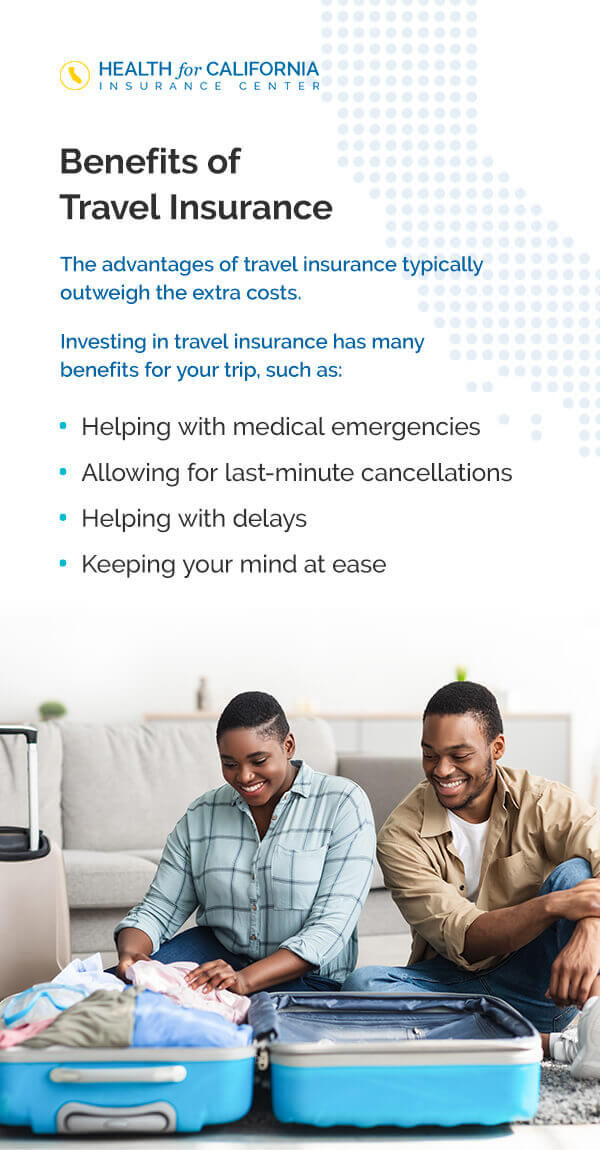How to Know When You Need Travel Insurance
Posted: July 27, 2022

Travel is an exciting way to explore the world. Whether you take a trip across the country or the other side of the world, you can learn about new cultures and try new ways of life. Many people take advantage of travel’s benefits, with millions of Americans traveling each year.
When planning for a trip, one factor to consider is travel insurance. Travel insurance offers coverage for potential risks or financial losses during your trip. Depending on the type you select, it could cover anything from lost luggage to travel-related injuries. The insurance keeps you from losing money in case of emergencies.
Many travelers debate whether travel insurance is worth the extra cost. Read on for more information about when to use travel insurance.

Is Travel Insurance Worth It?
One of the biggest questions people pose about travel insurance is whether it’s worth the additional payment. It can sometimes be tricky to understand when you need travel insurance and when you don’t.
Travel can often be expensive, from transportation costs and hotel bookings to entertainment plans. As you create your initial budget, it’s easy to get overwhelmed by all the varying costs. And these feelings can carry over as you consider the additional cost of travel insurance. Many wonder if it’s worth the extra charge on top of their other expenses.
Everyone wants to assume nothing will go wrong during their travels. But in the case of emergencies or other incidents, travel insurance is highly beneficial. In many cases, it’s worth the additional investment, especially for overseas trips.
For example, if you or one of the travelers in your group faces a serious medical emergency while abroad, travel insurance could help you manage costs. Many medical insurance plans do not provide coverage when you’re out of the country. Without assistance from insurance, you would face massive medical bills. However, you could select an international travel insurance plan that offers healthcare coverage. The plan could reduce your hospital bills or cover them completely.
In cases like this, investing in travel insurance is definitely worth it. Trip insurance typically costs around 5% of your total travel costs. When you compare this price to potential emergency costs, such as a medical bill, you’ll likely find the insurance worth getting.
Considerations for Travel Insurance
However, the ultimate decision to get travel insurance depends on your trip’s nature and comfortability. While trip insurance is necessary for some types of travel, other trips might not need it.
Consider these factors as you decide:
- Your transportation plans: Think about how you’re getting to destinations and how this could affect your plans. Some types of travel insurance cover travel-related delays and can help with related expenses. For instance, travel insurance could be extremely advantageous if your itinerary features many different flights and layovers. If one of these flights gets delayed, your entire schedule could get thrown off. A travel insurance plan could help cover extra expenses during these delays.
- Your destination: Next, consider your trip’s destination. An overseas trip often poses more risks than a domestic one. Your health insurance might not extend out of the country, making a medical travel insurance plan essential. Traveling abroad often costs more than a trip within your country, too. Overseas flights and accommodations are sometimes more expensive. If you cannot go on vacation due to an emergency, you’d lose this money without travel insurance. The more your trip costs, the more beneficial travel insurance becomes.
- Your destination’s climate: You should also acknowledge the expected weather conditions of your destination. If you’re traveling to a place known for extreme weather conditions, you probably need travel insurance. For instance, if you travel to a hurricane-prone area during hurricane season, your risk of emergency becomes higher. These plans can help cover expenses related to weather. Travel insurance can also help provide reimbursements if your entire trip gets canceled or interrupted.
Overall, travel insurance is worthwhile for extended or overseas trips. If you’re only taking a short, domestic trip, it’s not necessary but still recommended.
Types of Travel Insurance Plans
Once you decide to add travel insurance to your trip, it’s time to select the best plan for you. People pick insurance plans based on their preferences and trip specifications.
Here are the major types of travel insurance plans available.
Cancellation Plans
For many travelers, last-minute cancellations are a significant fear. You might have to cancel your trip right before you leave for a variety of reasons, such as:
- Sickness
- Family emergency
- Changes in your financial situation
- Inclement weather
Any of these situations could cause you to cancel days or even hours before your trip begins. When booking your travel accommodations, many expenses are nonrefundable. Without cancellation coverage, a canceled trip could equal thousands in lost money.
A cancellation travel insurance plan allows you to receive reimbursement for nonrefundable fees if you have to cancel your trip due to an unforeseen circumstance. Plans outline qualifiable reasons for cancellation, and if you meet the criteria, you can earn back your trip expenses through an insurance claim.
Most cancellation policies cover these occurrences:
- Death in the immediate family or of a travel companion
- Serious injury to you or your travel companion
- Nonoperating transportation services (due to strikes, weather, lack of staffing, etc.)
- Unexpected natural disasters
- Legal obligations, such as jury duty
So, if you have to halt your travel plans because of one of these reasons, a cancellation policy can help you retrieve the funds you’ve spent so far on the trip.
However, most cancellation plans only cover unexpected situations or events. If you had prior knowledge of an event or condition and need to cancel later on because of it, a cancellation policy might not offer full reimbursement. For example, if a hurricane was predicted for your destination weeks in advance and you booked anyway, the cancellation plan might not assist you.
Other expected events or conditions that wouldn’t be covered could include:
- Pregnancy
- Mental health conditions
- Acts of war or military duty

Travel Medical Plans
Next, a travel medical insurance plan covers the cost of medical expenses while traveling. If you get injured or experience a medical emergency during your trip, a travel insurance plan can reimburse some or all of your medical expenses. Without the insurance, you could be solely responsible for medical-related fees.
For example, a plan might cover reasonable costs for:
- Ambulance costs
- Hospital charges, such as an operation
- X-rays or lab treatments
- Medications or prescriptions
- Some instances of dental care
These plans are available for international and domestic trips. Because your health insurance coverage might not extend to other countries, it’s usually recommended that you invest in travel insurance for out-of-the-country trips.
Medical evacuation insurance plans are also available. This coverage pays for your transport to the nearest medical facility if you are critically injured. Evacuations can also take you back home to your preferred provider if needed. You can typically purchase medical evacuation coverage as part of a medical insurance plan.
Baggage Coverage
Another type of travel insurance is baggage coverage. This plan provides compensation for lost or delayed luggage. For instance, if you arrive at an airport and find your luggage is lost or damaged, the insurance can provide monetary assistance.
There are usually two types of baggage coverage available:
- Loss insurance: This type covers luggage that is lost, damaged or stolen during transport. Plans can cover different overall values, so everything in your luggage might not be covered depending on its value. For example, if you placed an expensive watch in your bag and it gets lost, the plan might not provide full reimbursement. It’s important to find a plan that covers the value of your overall luggage contents. If you only carry extra clothing, you probably won’t need to invest in the most expensive plan.
- Delay insurance: This is coverage for expenses that you incur because of delayed luggage. For example, you can receive reimbursements if your bags are 12 hours late and you have to purchase additional clothing or personal items.
Comprehensive Packages
Lastly, you can also purchase a comprehensive travel insurance package. A comprehensive plan usually covers many of the insurance types available for a packaged price. For instance, you could purchase a comprehensive travel insurance package that covers:
- Medical travel insurance
- Medical evacuation insurance
- Baggage insurance
- Cancellation insurance
These options are especially helpful for international trips, where having all of these insurance types at once is important. However, if you’re only interested in one type of coverage, you might opt for a single plan rather than a comprehensive one. It’s ultimately up to your preferences and travel needs.

Benefits of Travel Insurance
The advantages of travel insurance typically outweigh the extra costs. Investing in travel insurance has many benefits for your trip, such as:
- Helping with medical emergencies: Perhaps most importantly, medical travel insurance can help you stay safe during your travels. Emergency medical attention is often expensive, and travel insurance can help you manage costs. The safety of you and your travel companions is top priority, and insurance can help you access or afford emergency care.
- Allowing for last-minute cancellations: You could want to cancel travel plans for a variety of reasons, from a change in finances to emergency operations or a lack of interest. A cancellation insurance plan can reimburse you for nonrefundable costs, meaning that you can cancel your trip without losing all of your payments so far. This reimbursement is extremely beneficial — last-minute emergencies won’t cause you to lose hundreds or thousands in expenses.
- Helping with delays: Travel delays are unfortunately common, especially after the COVID-19 pandemic. If your schedule is full of flights and layovers, delays could throw your entire schedule off. Travel insurance can help cover expenses during these delays, making the overall experience easier.
- Keeping your mind at ease: Aside from all of the other advantages, travel insurance can give you peace of mind for your vacation. You can enjoy your vacation more fully with the knowledge that emergencies will be covered. If you lose your luggage, experience a medical emergency or need to cancel last minute, you can receive monetary assistance. With more ease of mind, you can plan and enjoy your trip with more ease.
Overall, the importance of travel insurance typically makes it worth the extra costs.
How to Enroll in Travel Insurance
Once you’ve decided on purchasing travel insurance, it’s time to select a plan. With many companies and plans available, picking the best option can sometimes seem confusing. You must consider the specificities of your trip and use that to help you choose the best plan.
For example, if you’re traveling internationally, medical insurance coverage and luggage insurance might be most essential. You should search for plans that specifically cover these two instances.
Travelers usually purchase insurance a few days after they book their trip. You can select an insurance plan for:
- Single trips: These plans only provide coverage for a single trip and are good options for those that don’t travel frequently.
- One year of coverage: With a year’s worth of travel insurance, all of your trips are covered for an entire year.
You can enroll in a travel insurance plan through a variety of options. There are also many comparison sites available where you can compare insurance plans more easily. Insurance plans are available through travel agents, reservation sites or travel insurance companies.
Read the Fine Print
As you decide on a plan, be sure to read the details of the policy closely. You need to understand information about reimbursements, coverage exclusions and other restrictions before signing up for a plan.
Make sure to read the insurance policy’s clauses about:
- Refund policies: Refund and reimbursement methods can vary by insurance plan. Make sure the refund policy works with your financial situation and timeline.
- Luggage limits: If you’re interested in luggage coverage, ensure you study how much coverage a plan offers. Some plans have daily limits on luggage value or weight or have different rules about electronics.
- Other exclusions: Lastly, read the fine print about other exclusions in the policy. For example, many plans include clauses about pre-existing medical conditions. You should ensure your condition is covered if this is a concern for your travels.
When in doubt, you can ask travel agents or insurance professionals for more assistance with plan selection. They can help you find the best plan for your needs and go over the policy’s details.
Learn More About Travel Insurance With Health for California
Travel insurance is an excellent option for travelers. With the additional peace of mind, you can enjoy your trip with less hassle and worries. If you’re a frequent traveler in California, consider adding travel insurance to your next trip.
Health for California can assist you through the travel insurance application process. Whether you’re looking for short-term travel insurance, international health insurance or anything in between, we can help you find the right plan. Our quick and hassle-free application process can get you approved in no time.
To get started with Health for California, request a quote today or contact us for more information.
